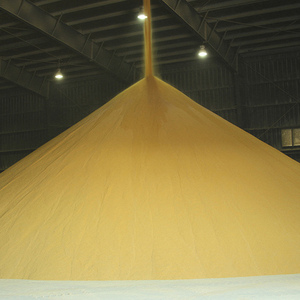Commodities: DDGS working back into U.S. rations with price drop

July 1, 2015
BY Sean Broderick, CHS
Going into July 4, the demand from China, which had been keeping DDGS prices well above the levels that worked into U.S. rations, has dropped off. And, so have prices. Since last month, values are off about 25 percent, to the point where it is being more widely considered for inclusion by U.S. feeders that effectively had kicked it out.
Chinese soymeal availability is widely considered to be the reason for the decreased demand, as South American soybean boats, some of which were late to ship, began arriving in earnest in the late spring. Like they do here in the U.S., feeders there were presented with the cheaper per-unit-of protein soymeal, and DDGS, which was being primarily being used for its protein content, fell out of favor as a ration staple. Couple that with the delivery of several bulk DDGS vessels at the same time, and suddenly protein supply in China was no longer an issue. Prices in the U.S. went from 130 percent plus the value of local corn down to 115 percent in a very short period of time as shipments were delayed and, or cancelled.
Eventually, Chinese soymeal will be consumed and DDGS demand from there will pick up again. There is already interest for fourth quarter shipments, albeit at lower values than what is being quoted today, and the lower percentage of corn values are incenting domestic demand. The question is whether Chinese sales that are on the books will actually end up shipping, or being re-sold back in the U.S. Normally, this time of the year, corn crop conditions influence DDGS prices as well. But this year, is all about China.
|
DDGS Prices ($/ton) |
||||
|
LOCATION |
July 2015 |
June 2015 |
July 2014 |
|
|
Minnesota | ||||
Advertisement
Advertisement
120
160
160
Chicago
157
185
185
Buffalo, N.Y.
160
Advertisement
Advertisement
175
180
Central Calif.
195
214
217
Central Fla.
178
204
190
Related Stories
CARB on June 27 announced amendments to the state’s LCFS regulations will take effect beginning on July 1. The amended regulations were approved by the agency in November 2024, but implementation was delayed due to regulatory clarity issues.
Legislation introduced in the California Senate on June 23 aims to cap the price of Low Carbon Fuel Standard credits as part of a larger effort to overhaul the state’s fuel regulations and mitigate rising gas prices.
The government of Brazil on June 25 announced it will increase the mandatory blend of ethanol in gasoline from 27% to 30% and the mandatory blend of biodiesel in diesel from 14% to 15%, effective Aug. 1.
The U.S. EIA reduced its 2025 and 2026 production forecasts for a category of biofuels that includes SAF in its latest Short-Term Energy Outlook, released June 10. The forecast for 2025 renewable diesel production was also revised down.
The U.S. exported 21,545.9 metric tons of biodiesel and biodiesel blends of B30 and greater in April, according to data released by the USDA Foreign Agricultural Service on June 4. U.S. imports of biodiesel were at 4,417.3 metric tons for the month.
Upcoming Events









